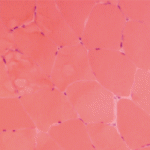In treating patients who develop elevated CK levels, Dr. Mammen will generally continue statin use unless the CK gets to be triple baseline levels or they become weak—in which case, he’ll discontinue use and see if they improve. If they don’t, he’ll look for another type of myopathy.
He emphasized the continued benefit of statins despite these potential problems.
“Statins, despite everything I just spent the last half-hour telling you, are really great medications, and for most of our patients, the benefits of these medications far outweigh the risks,” Dr. Mammen said.
Viral Infections with Rheumatic Manifestations

Dr. Jonas
Beth Jonas, MD, associate professor of medicine at the University of North Carolina School of Medicine’s Thurston Arthritis Research Center, reviewed viral infections that may present with rheumatic symptoms.
Hepatitis A, B and C infections can bring about these symptoms, but rheumatologists in the U.S. are most likely to see chronic hepatitis C (HCV) patients. Chronic HCV infection is associated with cryoglobulinemic vasculitis, arthritis and, sometimes, polyarteritis nodosa. The arthritis associated with HCV is usually non-erosive, but the disease can be difficult to distinguish from RA because many patients are RF positive, although a negative CCP antibody can help. HCV arthritis is more often seen in women, in older patients and in patients with more advanced fibrosis of the liver.
Physicians need to know that RA and HCV can coexist.
Patients treated with interferon for HCV can see their RA worsen, Dr. Jonas cautioned.
“I’ve seen patients who were diagnosed with HCV and thought to have HCV-related arthritis. Treatment with interferon led to a complete virologic response, but the arthritis persisted. In retrospect, the arthritis was likely RA.”
She also warned clinicians to be on the lookout for patients infected with the Chikungunya virus, which was first seen in Africa but has now spread to the Americas. Hundreds of cases have been seen in the U.S., mostly in Florida and New York in patients who have returned from the Caribbean.
Symptoms include fever, arthralgia and arthritis, and myalgia that can render some patients bedridden. In most patients, the fever and rash resolve in one to two weeks, but the arthritis can persist past six weeks or even much longer.
A 2012 study from India after an outbreak there found that arthritis or arthralgia lasted more than six weeks in 315 of 509 patients, and 5% had arthritis more than two years later.4

